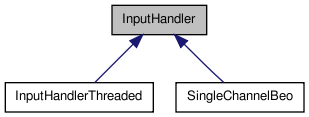

Auxiliary class that can override parts of SingleChannel's functionality. More...
#include <Channels/InputHandler.H>

Public Member Functions | |
| virtual void | handleInput (SingleChannel &chan, const Image< float > &bwimg, const SimTime &t, const Image< byte > &clipMask, const rutz::shared_ptr< PyramidCache< float > > &cache)=0 |
| virtual void | waitForOutput (SingleChannel &chan)=0 |
Static Public Member Functions | |
| static rutz::shared_ptr < InputHandler > | clone (rutz::shared_ptr< InputHandler > h) |
| Like h->makeClone(), but works with null pointers, too. | |
Auxiliary class that can override parts of SingleChannel's functionality.
Definition at line 51 of file InputHandler.H.
| rutz::shared_ptr< InputHandler > InputHandler::clone | ( | rutz::shared_ptr< InputHandler > | h | ) | [static] |
Like h->makeClone(), but works with null pointers, too.
The point of this is to allow us to pass one InputHandler to a ComplexChannel, and then let that ComplexChannel make multiple clones of the handler to pass to each of its subchannels. This means that there may be many clones of a given InputHandler, but only some of them (i.e., the ones sitting in SingleChannel objects) will ever see any input; the other ones (sitting in ComplexChannel objects) won't be used except to instantiate additional clones when needed. In terms of implementation, this means that InputHandler classes shouldn't do anything "heavy" until they actually receive some input. Along those lines, the prototypical InputHandler subclass is the beowulf BeoInputHandler, which doesn't do a Beowulf::requestNode() in its constructor, but rather waits until it gets a handleInput() call. That way it is safe to have more BeoInputHandler objects than we have Beowulf nodes, as long as only a subset of the objects actually request Beowulf nodes.
Definition at line 51 of file InputHandler.C.
References rutz::shared_ptr< T >::is_valid().
Referenced by SingleChannel::cloneInputHandler(), and SingleChannel::setInputHandler().
 1.6.3
1.6.3